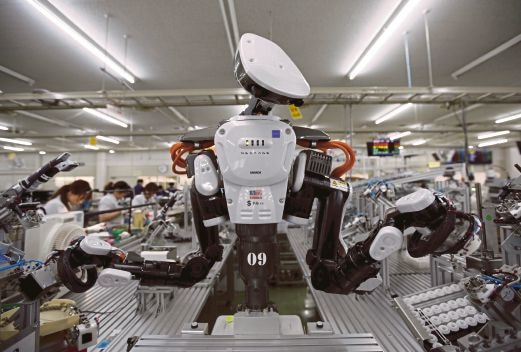“It is not the strongest or the most intelligent who will survive, but those who can best manage change” — a saying by Charles Darwin, which has never been more apt than it is recently.
Malaysia’s growth, even though steady with over an annual average of 6.4 per cent since 1970, has been declining in the past couple of years. The failure of the ringgit to trade at the optimum level in recent months is not helping either.
Seeing the potential for a paradigm shift leveraging innovation, especially digitalisation, it is crucial to jump onto the bandwagon as fast and as intense as we could to boost the economy and, more importantly, to not “lose” in this digital race and reduce our wealth.
To adapt and adopt, or to change, involves the way we think and the way we act. It involves being proactive, not reactive. The demise of big businesses that failed to change is real.
Kodak, for instance, was impacted when instant photography became the new trend. Borders, was disrupted when the book-selling industry was hit hard with the advancement of e-marketplaces. Blackberry, once a prominent smartphone brand, was destroyed by the rise of competitors, such as Apple and Samsung, a rivalry in one of the most rapidly evolving industries in the world.
If we look at countries where digital impact is growing the fastest, our neighbours — such as China, India, Bangladesh and the Philippines — would be great examples.
India has established a highly-educated and skilled workforce by training its people with innovation skills. Indian companies now assist in constructing everything from aircraft engines to life-saving drugs. Another example, Bangladesh, one of the poorest countries in the world, drives the production of innovative digital-based financial services, such as “bKash”.
The service, which is used by millions, allows people to obtain financial services, like transferring money and pay for purchases in shops, medical bills and university fees.
According to MIT Sloan research, companies that are adapting to a digital world are 26 per cent more profitable than their industry peers.
In Malaysia, although innovation and digitalisation can be observed, the adoption rate is very slow. People are resistant and not pushing the growth of innovation and digital technology to the maximum.
If we compare ourselves to other similar economies, they are developing so much more within a similar time frame.
So, what went wrong? What caused this resistance in our society? Why do companies resist change?
Not feeling the need, or an insufficient push, is a key factor. Perhaps there is not enough incentive or disincentive to do so.
Perhaps it is easier being complacent with what we have. Or perhaps we are comfortable with hiring foreign workers, who will do the hard, tedious work or manual jobs for us, therefore, negating the drive to automate or simplify our systems and processes.
The lack of diversity of decision- makers in companies can also contribute to the slow adoption of technology and innovation.
Since top executives are typically of similar age, background and are used to doing things a certain way, they become a handicap in making sense of the changing business environment.
Moving forward, one of the most important things to do is to eliminate cultural and organisational challenges that hinder change at a required pace.
Also, hiring people of different background, skill and experience can provide a different point of view, which can spark innovative ideas.
This can also encourage collaborative innovation, either in the organisation or beyond, which is a great way to react to the rapid, agile and highly-competitive business environment.
The third reason for resistance is the intolerance of failure in society. Small- and medium-enterprises and big companies tend to be risk-averse, pursuing what is “safe” by following what they know best.
Thus, there is a strong need to develop a culture that encourages trial and error in society for us to have higher vision and push our businesses to a bigger scope.
If we look into the areas of improvements for Malaysia on a country level, how can we progress ahead?
According to the Organisation of Economic Cooperation and Development’s economic assessment, Malaysia can benefit from the improvement of its public governance.
Malaysia’s transformation has become one of Asia’s greatest success stories, with an important role played by the government in guiding and championing its growth through various stages of development.
However, the governance of science, technology and innovation, which comprises various parties — including ministries, agencies and government-linked corporations strategising and implementing their own activities — has resulted in weak connections between the innovation actors. Therefore, a more robust coordination, including information exchange, needs to be implemented to break down the silos.
As the saying goes, “The bad news is time flies. The good news is you’re the pilot”. Just three weeks ago, we welcomed in 2017, which means that there are just three years left to 2020.
Do you think when that time finally comes, we will become what we have always dreamed of?
This article first appeared in New Straits Times, 24 January 2017.





